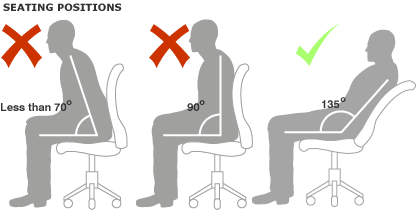Did you know that your sedentary lifestyle could be killing you from the inside out? Ryan has already presented a case on potential health risks from sitting too long, and for those of us who work with computers or spend all of our free time on our desktops, those health risks are all too real: obesity, diabetes, cancer, etc. Take charge of your health before it takes a permanent turn for the worst.
If you don’t think you’re at risk, or if you think you’re young enough that none of this matters yet, I would ask that you reconsider. Even if you don’t work eight hours in front of a computer every day, playing Diablo 3 or Call of Duty for hours at a time is just as detrimental. And we’re not just talking about long-term health damage - improper computer usage can drain your energy, strain your eyes, and fog up your brain.
Are you at risk? Check these tips and examine yourself for areas where you might not be as pristine as you first thought. Your body and mind will thank you.
Proper Workstation Setup
There’s a lot of freedom that you can enjoy when setting up your workstation (or gamestation, if that’s the main purpose for your computer). With that said, there are two main factors that you want to consider in your layout and both are related to posture. Improper posture puts undue stress on parts of your body, resulting in faster exhaustion, strained muscles, or even injury.
Tip #1: Correct sitting posture. As it turns out, sitting up straight is not the best position for your spine - the best angle is somewhere between 120 and 135 degrees. You want your shoulders to always remain relaxed; your forearms and your hands should form a straight line; your feet should be flat on the floor; and the top of your monitor should be at eye-level. All of this leads to the least amount of stress on your body.
Tip #2: Use a standing desk. Here at MakeUseOf, we’ve spoken a lot on the merits of the standing desk so I won’t delve into that. Suffice it to say that standing helps improve your overall posture, increases your stamina over time, and works as a reminder to take frequent breaks. Dave has written a great guide on building a cheap standing desk from scratch and Tina has compiled a great list of standing desk designs.
Minimize Eye Strain
When it comes to computer-related fatigue, one of the biggest culprits often gets forgotten: your eyes. Back pain and sore muscles are easy to notice, but we tend to overlook the fact that our eyes are tired, blurry, and dry -- and that impacts the rest of your mood and energy more than you think it would.
Tip #3: Correct ambient lighting. The first thing you want to do is make sure that your ambient light isn’t very bright at all. Harsh fluorescent overhead lights and bright sunlight will cause your eyes to strain as they try to read the screen. If possible, use shades and curtains to dampen any bright sources of light, and replace fluorescent bulbs with incandescent or halogen lighting.
Tip #4: Optimize screen settings. Your screen’s brightness should match that of your ambient lighting. One way to test: if looking at a blank white screen feels like you’re looking into a light bulb, it’s too bright. On the other hand, if it feels drab and gray, then your brightness is probably too low. Fortunately, there are a few helpful apps and programs for screen-related eye strain.
Tip #5: Blink regularly. Computer screens have a way of stealing all of our attention, and that means that we’re often so engrossed in what we’re doing that we forget to blink. This causes our eyes to dry out, which can lead to itchy eyeballs, blurry vision, exhaustion, or in rare cases, eye damage, so try to blink regularly. If you need dry eye relief, be sure to use eye drops that are meant for lubrication, NOT red eyes. Don't forget to consult a doctor if you feel any debilitating effects.
Take Frequent Breaks
Perhaps the greatest problem is that we forget that we’re on the computer. Four hours can fly by in the blink of an eye and suddenly our bodies are worn out, our minds are deflated, and we just have no energy to do anything else… so we stay on the computer even longer. The absolutely best way to minimize health risks from computer usage is to take regular breaks.
Tip #6: Get your blood flowing. As mentioned before, the best thing for your body is to get it moving. Circulating your blood is essential for improved physical health and energy. Every once in a while - preferably at least once every hour - get up from your desk and shake your limbs about. If possible, go for a walk, even if it’s only to the restroom.
Tip #7: Refresh your mental clarity. If you can, try to break your attention away from the computer every twenty to thirty minutes. Strike up a conversation with a friend or coworker - five minutes is more than long enough. Look out the window and enjoy the scenery. Or even close your eyes for a few minutes (but don’t fall asleep!). This helps prevent your mind from feeling like it’s sloshing through mud.
Tip #8: Use the Pomodoro technique. For those of you that have a hard time remembering to take breaks, the Pomodoro technique is exactly what you need. It’s a system of interweaving short breaks with longer periods of work and, as a bonus, it’s been known to have a dramatic impact on productivity. There are plenty of Pomodoro technique apps and programs for you, too.
Tip #9: Learn to relax. Taking a break isn’t really taking a break if you’re still caught up on whatever it is from which you’re taking a break. Sometimes the best thing to do is just sit back and relax - no, really relax. Ease the tension and clear your mind. Tina has compiled a whole bunch of tools to aid you in relaxation.
Conclusion
That’s a lot of information to digest, especially if you haven’t been doing any of the listed tips. It will be overwhelming if you try to completely revamp your lifestyle overnight, so I recommend picking two or three things from the list that you aren’t already doing and try to apply them over the next few weeks. Once those become habits, you can pick a few more from the list, rinse, and repeat.
What other tips and tools do you know for fighting computer fatigue and maintaining good health? Please share them with us in the comments!
Image Credits: Proper Posture via BBC, Eye Strain Via Shutterstock, Relaxed Worker Via Shutterstock




